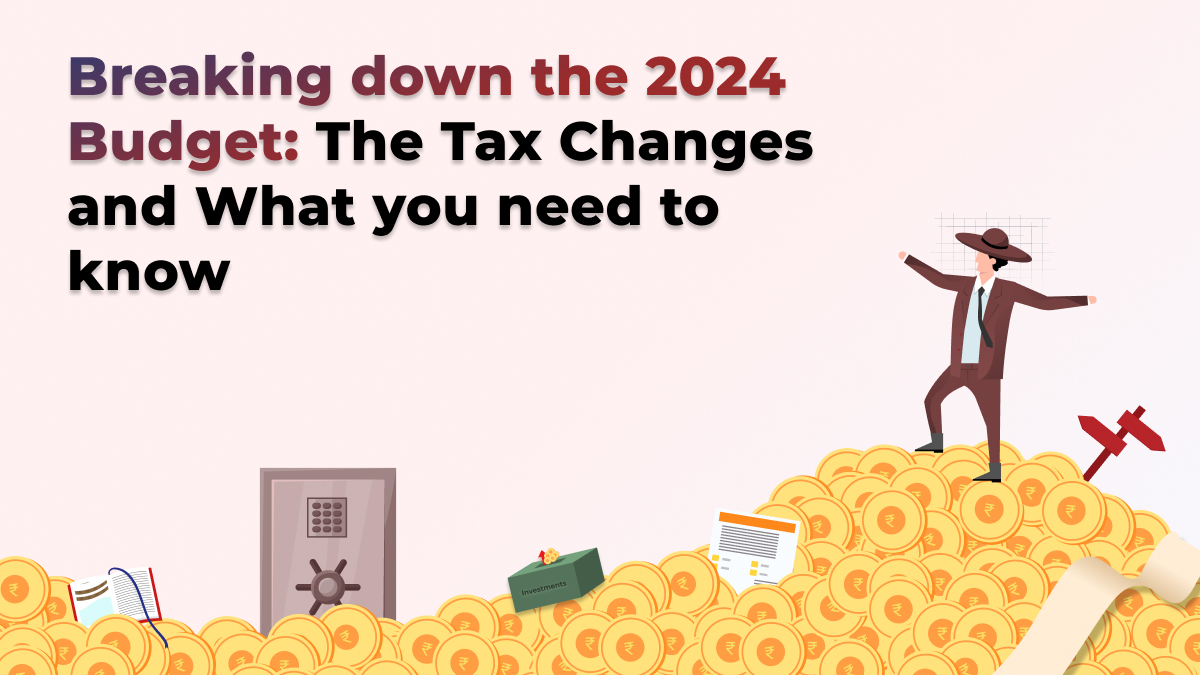The 2024 budget focuses on several key areas: boosting economic growth, improving infrastructure, and supporting healthcare and education. The budget aims to balance growth with fiscal responsibility. Among the major changes, tax reforms stand out as they directly impact individuals and businesses.
Major Tax Changes
- Income Tax Adjustments
- New Tax Rates (New System):
- ₹0 to ₹3,00,000: No tax
- ₹3,00,001 to ₹7,00,000: 5% tax
- ₹7,00,001 to ₹10,00,000: 10% tax
- ₹10,00,001 to ₹12,00,000: 15% tax
- ₹12,00,001 to ₹15,00,000: 20% tax
- Above ₹15,00,000: 30% tax
- These new rates mean that if you earn more, you will pay more in taxes, but there are also higher exemption limits to help lower earners.
- New Tax Rates (New System):
- More Benefits in the New System
- Standard Deduction: This is a fixed amount that reduces your taxable income. It has been increased from ₹50,000 to ₹75,000. This means if you are a salaried individual, you can reduce your taxable income by ₹75,000.
- Family Pension Deduction: This has been increased from ₹15,000 to ₹25,000, allowing families to save more on taxes.
- Employer’s Contribution Deduction: The deduction under section 80CCD(2) has been increased from 10% to 14% of salary and dearness allowance. This means you can save more tax on your employer’s contribution to your pension.
- Lower Surcharge Rates
- The extra tax (surcharge) for those earning over ₹5 Crores is now reduced from 37% to 25%. This is a significant reduction and will benefit high-income earners who opt for the new tax regime.
- Higher Rebate Limit
- If you earn up to ₹7 lakhs, you can get a rebate (money back) of ₹25,000 under the new system. This means no tax for people earning up to ₹7 lakhs, making the new system more attractive for middle-class earners.
- Standard Deduction for Salaried Individuals
- The standard deduction has been increased to ₹75,000 in the new system, making it simpler and more beneficial for salaried individuals.
- Other Deductions
- Family Pension Deduction: Increased to ₹25,000, helping families save more.
- Agniveer Corpus Fund Deduction: New deduction introduced for amounts paid to the Agniveer Corpus Fund, providing additional tax-saving opportunities.
- Changes in Life Insurance Taxation
- If your life insurance premium is more than ₹5 lakhs per year, the earnings will now be taxable (excluding ULIPs). This change is aimed at preventing misuse of high-premium policies for tax exemptions.
- Capital Gains Tax Changes
- Long-Term Capital Gains (LTCG): The tax rate has been changed to 12.5%, making it simpler but potentially increasing tax for some.
- Short-Term Capital Gains (STCG): The tax rate has been increased to 20%, which will affect those who sell assets within a short period.
- Exemption Limit: Increased to ₹1.25 lakhs, providing some relief to small investors.
Benefits and Drawbacks
- Benefits
- Simpler Tax Planning: The new tax regime aims to simplify tax planning by reducing the need for maintaining numerous documents.
- Higher Exemption Limits: More people can benefit from higher exemption limits and standard deductions, reducing their taxable income.
- Less Tax for Middle-Class Earners: With higher rebates and standard deductions, middle-class earners stand to gain the most from these changes.
- Drawbacks
- Adjustment to New Rates: Some people might find it challenging to adjust to the new tax rates, especially those who have been used to the old system.
- Higher Capital Gains Tax: The increased rates on capital gains might deter short-term investments.
How These Changes Affect You
- Families and Single Individuals
- Families and single individuals are likely to benefit from the higher exemption limits and increased standard deductions. For example, if you are a salaried person earning ₹7.5 lakhs, the new standard deduction and rebate could mean you pay no tax at all.
- Small Business Owners
- Small business owners can benefit from the increased limits under the presumptive taxation scheme. This means less paperwork and easier tax calculations.
- High-Income Earners
- High-income earners will benefit from the lower surcharge rates, reducing their overall tax burden if they opt for the new system.
Conclusion
The 2024 budget introduces several tax changes aimed at simplifying the tax process and providing relief to taxpayers. By understanding these changes and planning ahead, you can make the most of the new tax rules. Whether you are a salaried individual, a small business owner, or a high-income earner, staying informed and proactive about these changes will help you manage your finances better.

Comments
One response to “Breaking Down the 2024 Budget: The Tax Changes and What You Need to Know”
Tech to Trick Hi there to all, for the reason that I am genuinely keen of reading this website’s post to be updated on a regular basis. It carries pleasant stuff.